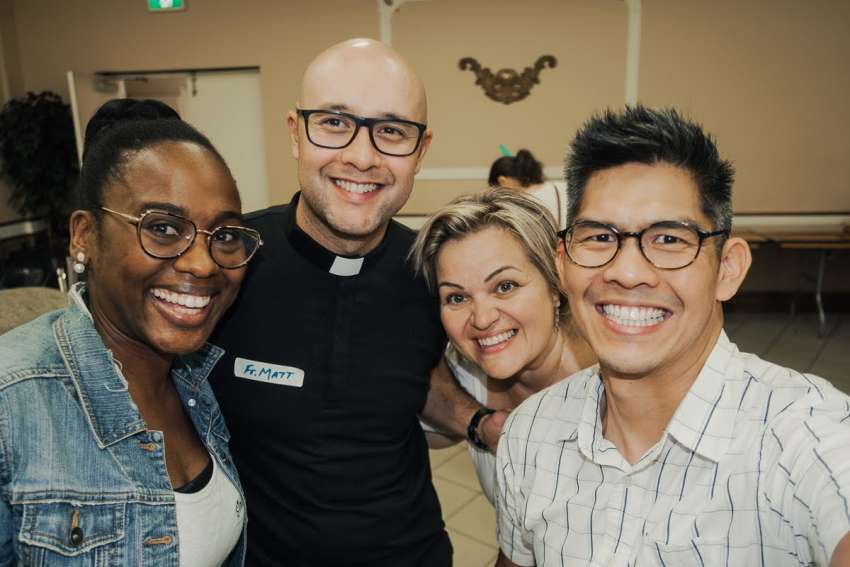And in that half-century, little has changed for this campus ministry. Catholic Chaplaincy at York continues to promote intellectual formation, spiritual growth, community and service.
“Whether it is learning about what they believe in and how it applies to the real world, physically attending devotional activities like Mass, the Rosary or the Stations of the Cross, attending social events with other like-minded Catholics or sharing their gifts in a way that helps the less fortunate, the Catholic Chaplaincy at York provides all of these opportunities and more,” said Eliza Trotter, associate director of Diocesan Campus Ministries for the Archdiocese of Toronto.
The Catholic Chaplaincy at York is kicking off celebrations that recognize its 50 years of Catholic ministry at York June 22 with an alumni picnic, the first of many commemorative festivities. Taking place at St. Patrick’s Parish in Brampton, alumni will celebrate Mass at 12:30 p.m. followed by a BBQ picnic.
The chaplaincy's roots date to 1974, 15 years after York University had officially opened its doors at its original location at what is now York's Glendon College at Bayview and Lawrence Avenues. But a significant Catholic presence had already been established at the school many years prior.
“As early as 1964 there was a professor who was also an Augustinian Catholic priest who was invited by Archbishop (Philip) Pocock to celebrate Sunday Mass at York University," said Trotter. "Here was a new university that did not have a Catholic college within it as the University of Toronto did, but with all these students living in residence together, it was important to provide an opportunity for them to be able to attend Mass on Sundays.”
After a decade of celebrating Sunday Mass at the school informally, Pocock named Fr. Gerry Tannam the first official chaplain in 1974, marking the start of a campus ministry that began to involve students in the Catholic faith beyond one hour on Sundays.
“In order to provide activities for students on any of the campuses, you needed to have a recognized student club. The formation of the chaplaincy allowed the official Catholic student presence to work in tandem with the assigned priesthood to allow for things like a central office, regular Masses, student events, activities and guest speakers,” Trotter said.
During the first three decades of operations, the Catholic presence at York University continued to expand thanks in large part to the work of the chaplaincy. Through contributions from the Archdiocese in the late 1980s, a small campus ministry centre was built within the student centre building of the school, a location unique to York that now acts as a space for daily Mass as well as a popular lounging area for students to study and engage in matters of faith.
One change came in the year 2000, when the Companions of the Cross were asked by the Archdiocese to take over the chaplaincy. The religious order remains, with current chaplain Fr. John Paul Bolger.
Although the core four elements being provided remain the same, emphasis on intellectual formation in the faith as well as the importance of community have been key points that York’s chaplaincy is looking to further amplify in today’s increasingly secular society.
“The reality is that many students moving away from home may not be fully rooted in a parish. All parishes do an amazing job with the pillars I mentioned but since they have to serve so many different groups, they can not always provide something specifically for the student demographic — that is what these chaplaincies have done and will continue to do,” said Trotter.
“The 18 to 25 age range is really the time when a young person forms their view of life more thoroughly and where they make their faith their own. It is no longer just something that mom and dad told them was important, and so our campus ministries have increased their emphasis on helping students know that our Catholic faith has something to say to the modern world.”
The alumni picnic is open to all former members of York University and is not exclusive to those who were a part of the catholic chaplaincy.
“We hope this event continues to build awareness that campus ministry exists and that it is serving a very important need that is both vibrant and growing. As well, we hope to further develop a community of prayer, meaning that if there is someone who went to York in 1982 who can now pray for the students who are there in 2024, that is a beautiful thing,” Trotter said. “All of these connections that unite people in the mission of the chaplaincy are a real win from this alumni event.”
Other schools across the eight campus ministries within the Archdiocese of Toronto are celebrating milestones this year as well, with Toronto Metropolitan University (formally Ryerson) and University of Toronto Scarborough’s chaplaincies commemorating 25 and 10 years of operations respectively.
The Office of Catholic Youth has launched a connections initiative for all Archdiocese chaplaincies at https://docs.google.com/forms/d/e/1FAIpQLScXC6R3K4JqmGIafVi4IhpbWBLV2WVK8WBQRHaLAp0JKasLIw/viewform.


